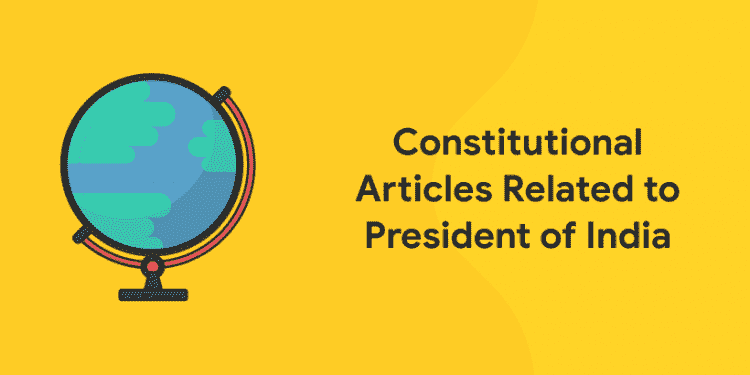Table of Contents
The President of India is the head of state of India. The President is also the Commander-in-Chief of the Indian Armed Forces. The president is indirectly elected by an electoral college comprising both houses (Rajya Sabha & Lok Sabha) of the Parliament of India and the elected members of the legislative assemblies of each states and Union territories of India. Part V of the Constitution (The Union) under Chapter I (The Executive) lists out the qualification, election, impeachment and powers vested upon the President of India. Having thorough knowledge on constitution will help in cracking your competitive exams. In this article we will discuss about the articles mentioned in the constitution related to President of India.
List of Articles Related to President of India
Below we have mentioned in detail about all articles that states qualification, election, impeachment and powers exercised by the President of India.
Part V of the constitution – The Union
Chapter 1: The Executive
Article 52: The President of India.
Article 52 says that ‘There shall be a President of India’. The President of India is the Head of the State, head of legislature, Executive and Judiciary. Also he is the Commander-in-Chief of the Indian Armed Force.
Article 53: The Executive Power of the Union
Article 53 (1) says that The Executive Power of the Union shall be vested in the President and shall be exercised by him either directly or through officers subordinate to him in accordance with this Constitution. Also the supreme command of the Defence Forces of the Union shall be vested in the President and the exercise thereof shall be regulated by law.
Article 54: Election of President
- In the article 54 it is said that- The President shall be elected by the members of an electoral college consisting of –
(a) the elected members of both Houses of Parliament; and
(b) the elected members of the Legislative Assemblies of the States.
Article 55: Manner of Election of President
- There shall be uniformity in the scale of representation of the different States at the election of the President. Also the election of the President shall be held in accordance with the system of proportional representation by means of the single transferable vote and the voting at such election shall be by secret ballot.
Article 56: Term of Office of President
- (1) The term of office of President is five years from the date on which he enters upon his office. Provided that –
(a) He can resign from his office by handing written resignation letter to the Vice-President
(b) The President shall be removed from his Office for violation of the Constitution by impeachment
(c) The President shall continue to hold office after expiry of his term until his successor enters upon his office.
- (2) Any resignation addressed to the Vice-President shall be communicated by him to the Speaker of the House of the People.
Article 57: Eligibility for Re-Election
- Article 57 states that a person who holds, or who has held, office as President shall, subject to the other provisions of this Constitution be eligible for re-election to that office.
Download Entri & Practice free Quiz and ace your exam preparation
Article 58: Qualifications for Election as President
- Article 58 (1) says that a person must have the following qualification to become President of India –
(a) He must be a citizen of India;
(b) He must have completed thirty-five years of age and
(c) He must be qualified for election as a member of the House of the People. - (2) A person shall not be eligible for election as President if he holds any office of profit under the Government of India or the Government of any State or under any local or other authority subject to the control of any of the said Governments.
Article 59: Conditions of President’s Office
(1) The President shall not be a member of either House of Parliament or of a House of the Legislature of any State, and if he is a member of either Houses of Parliament or Legislature of any State, he shall be deemed to have vacated his seat in that House on the date on which he enters upon his office as President.
(2) The President shall not hold any other office of profit.
(3) The President shall be entitled to the use of his official residences without payment of rent and also he shall be entitled to such emoluments, allowances and privileges as determined by Parliament by law and until provision in that behalf is so made.
(4) The emoluments and allowances of the President shall not be diminished during his term of office.
Article 60: Oath or Affirmation by the President
- Oath or Affirmation by the President shall be made in the presence of the Chief Justice of India. in the presence of Senior most Judge of the Supreme Court in the absence of Chief Justice of India.
Article 61: Procedure for Impeachment of the President
- The President of India can be impeached only for violation of constitution and such charge shall be preferred by either House of Parliament.
- If such charge has been preferred by either House of Parliament, the other House shall investigate the charge or cause the charge to be investigated and the President shall have the right to appear and to be represented at such investigation. If as a result of the investigation a resolution is passed by a majority of not less than two-thirds of the total membership of the House by which the charge was investigated or caused to be investigated, declaring that the charge preferred against the President has been sustained, such resolution shall have the effect of removing the President from his office as from the date on which the resolution is so passed.
Article 62: Time of holding election to fill vacancy in the Office of President and the term of Office or Person elected to fill casual vacancy
(1) An election to fill a vacancy caused by the expiration of the term of office of President shall be completed before the expiration of the term.
(2) An election to fill a vacancy in the office of President occurring by reason of his death, resignation or removal, or otherwise shall be held as soon as possible after, and in no case later than six months from, the date of occurrence of the vacancy; and the person elected to fill the vacancy shall, subject to the provisions of article 56, be entitled to hold office for the full term of five years from the date on which he enters upon his office.
Article 72: Power of President to grant pardons, etc., and to suspend, remit or commute sentences in certain cases
Article 72 states that the President shall have the power to grant pardons, reprieves, respites or remissions of punishment or to suspend, remit or commute the sentence of any persons convicted of any offence –in all cases where the punishment of sentence is by a Court Martial, or for an offence against any law relating to a matter to which the executive power of the Union extends or in all cases where the punishment is a sentence of death.
Download Entri & attempt free mock tests for various government exams
Following articles mentions the Powers exercised by the President–
Article 75: Other provisions as to Ministers
- The President has the power to appoint the Prime Minister and the other Ministers
Article 76: Attorney General for India
- Article 76 (1) states that- The President shall appoint a person who is qualified to be appointed a Judge of the Supreme Court to be Attorney General for India.
Article 77: Conduct of business of the Government of India
- Article 77 says that the Conduct of business of government of India in the name of the President. The President of India has the right to allocate business among the ministers.
Article 85 states that The President may from time to time summon each House of Parliament for meetings. Also He may-
(a) Prorogue the Houses or either House.
(b) Dissolve the House of the People.
Article 86: Right of President to address and send messages to Houses
Article 86 states about the right of the President to address and set messages to messages to either House of Parliament.
Article 87: Special address by the President
- After each general election at the commencement of the first session, the President shall address both Houses of Parliament assembled together.
Article 111: Assent to Bills
When a Bill is passed by the Houses of Parliament, it shall be presented to the President, and the President shall declare whether he assents or refuse assent to the Bill.
Article117 States about the power of President regarding Financial Bills.
Article 123 states about the Power of President to promulgate Ordinances during recess of Parliament
Article 148 says that the President shall appoint the Comptroller and Auditor General of India.
Article 280 states that President shall constitute a Finance Commission consisting of a Chairman and four other members appointed by the President.
Article 316: Appointment of Chairman and members of UPSC by the President.
Article 339: Commission for the welfare of Scheduled areas and Scheduled Tribes appointed by the President
Article 340: Appointment of Commission to investigate conditions of backward classes by the President.
President of India
1: Who was the first woman President of India?
Current President of India: Ram Nath Kovind
- Born 1 October 1945, in Paraukh, Uttar Pradesh state is the 14th President of India since 25 July 2017.
- Previously he had served as the Governor of Bihar from 2015 to 2017
- He was a Member of Parliament, Rajya Sabha from 1994 to 2006.
- He was nominated as a presidential candidate by the ruling party NDA coalition and won the 2017 presidential election.
- Before entering politics, he was a lawyer for 16 years and practiced in the Delhi High Court and the Supreme Court until 1993.
- He holds a bachelor’s degree in commerce and an LLB from DAV College (affiliated with Kanpur University).
How you can use Entri app for your exam preparation:
- Entri provides an online platform to help you prepare for competitive exams.
- Download for free of cost and get access to video classes, exams and study cards with a single subscription fee.
- You can access full length mock tests and previous year question papers.
Hope you have benefited from this article. Check us for further details. Entri wishes you all the best for your upcoming exams.













